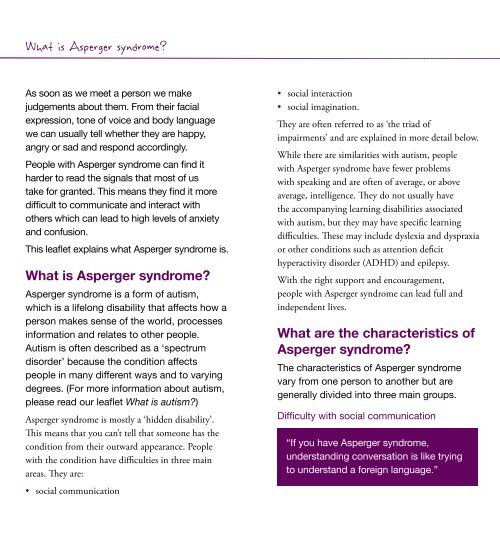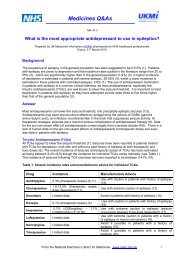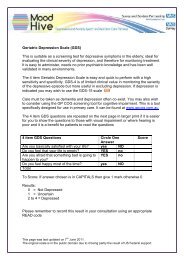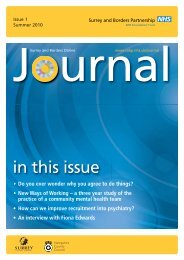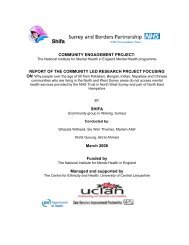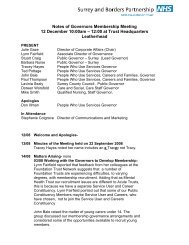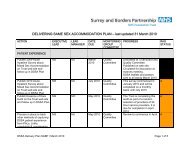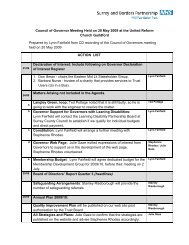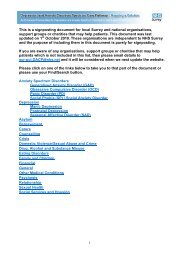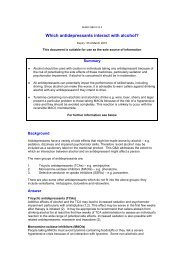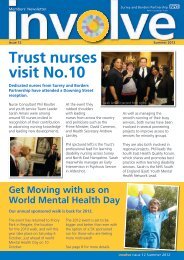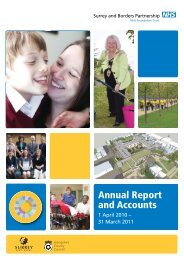Asperger syndrome
Asperger syndrome
Asperger syndrome
Create successful ePaper yourself
Turn your PDF publications into a flip-book with our unique Google optimized e-Paper software.
What is <strong>Asperger</strong> <strong>syndrome</strong>?<br />
As soon as we meet a person we make<br />
judgements about them. From their facial<br />
expression, tone of voice and body language<br />
we can usually tell whether they are happy,<br />
angry or sad and respond accordingly.<br />
People with <strong>Asperger</strong> <strong>syndrome</strong> can find it<br />
harder to read the signals that most of us<br />
take for granted. This means they find it more<br />
difficult to communicate and interact with<br />
others which can lead to high levels of anxiety<br />
and confusion.<br />
This leaflet explains what <strong>Asperger</strong> <strong>syndrome</strong> is.<br />
What is <strong>Asperger</strong> <strong>syndrome</strong>?<br />
<strong>Asperger</strong> <strong>syndrome</strong> is a form of autism,<br />
which is a lifelong disability that affects how a<br />
person makes sense of the world, processes<br />
information and relates to other people.<br />
Autism is often described as a ‘spectrum<br />
disorder’ because the condition affects<br />
people in many different ways and to varying<br />
degrees. (For more information about autism,<br />
please read our leaflet What is autism?)<br />
<strong>Asperger</strong> <strong>syndrome</strong> is mostly a ‘hidden disability’.<br />
This means that you can’t tell that someone has the<br />
condition from their outward appearance. People<br />
with the condition have difficulties in three main<br />
areas. They are:<br />
• social communication<br />
• social interaction<br />
• social imagination.<br />
They are often referred to as ‘the triad of<br />
impairments’ and are explained in more detail below.<br />
While there are similarities with autism, people<br />
with <strong>Asperger</strong> <strong>syndrome</strong> have fewer problems<br />
with speaking and are often of average, or above<br />
average, intelligence. They do not usually have<br />
the accompanying learning disabilities associated<br />
with autism, but they may have specific learning<br />
difficulties. These may include dyslexia and dyspraxia<br />
or other conditions such as attention deficit<br />
hyperactivity disorder (ADHD) and epilepsy.<br />
With the right support and encouragement,<br />
people with <strong>Asperger</strong> <strong>syndrome</strong> can lead full and<br />
independent lives.<br />
What are the characteristics of<br />
<strong>Asperger</strong> <strong>syndrome</strong>?<br />
The characteristics of <strong>Asperger</strong> <strong>syndrome</strong><br />
vary from one person to another but are<br />
generally divided into three main groups.<br />
Difficulty with social communication<br />
“If you have <strong>Asperger</strong> <strong>syndrome</strong>,<br />
understanding conversation is like trying<br />
to understand a foreign language.”


